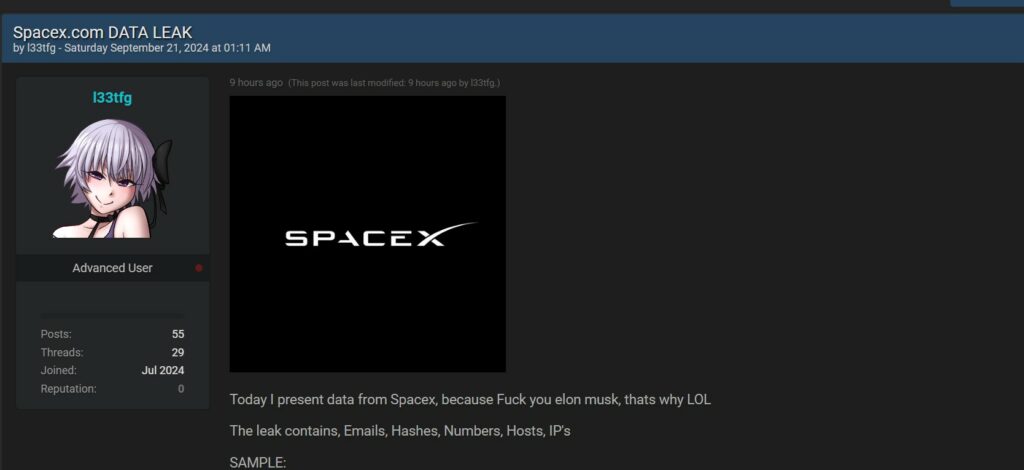
A recent post on a dark web forum has caught the attention of the international cybersecurity community. A user, identified by the nickname l33tfg, claimed to have published a supposed data leak from SpaceX, the aerospace company owned by Elon Musk. According to the post, the breach allegedly contains sensitive data including emails, password hashes, phone numbers, hosts, and IP addresses. While the news has not yet been officially confirmed by SpaceX or other verified sources, the incident could pose a serious threat to the organization and the security of its corporate data.
The post, dated September 21, 2024, was published by the user l33tfg, an individual registered on a well-known dark web forum since July 2024. Despite the relatively recent account, the user is classified as an “Advanced User,” which may indicate some level of experience or involvement in cybercriminal activities.

The declared motivation for the attack seems personal: “Because I have a problem with you, Elon Musk, that’s why.” However, this statement could be masking deeper reasons, such as revenge driven by ideological disputes or, more likely, an attempt to attract attention from the hacker community and potential buyers of the data.
The post claims that the exfiltrated data includes:
The malicious actor has also shared a sample of the data to prove the legitimacy of the breach, although no independent evidence has yet confirmed its authenticity. This strategy is commonly used to attract potential buyers or to inflict reputational damage.
If confirmed, the breach could have devastating consequences for SpaceX. The company, which handles globally significant projects such as satellite launches and space missions, heavily depends on the confidentiality of its operations, especially given its contracts with government entities and sensitive defense projects. The release of data related to collaborations with government or military agencies could have implications for U.S. national security.
Furthermore, SpaceX’s reputation could suffer a major blow. A cyberattack of this magnitude would reveal vulnerabilities in the security systems of one of the most advanced technology companies in the world, raising questions about the company’s ability to protect the sensitive information of its clients and partners.
Despite the seriousness of the claims, there is no official confirmation from SpaceX regarding the alleged breach at this time. The company has yet to issue press releases or data breach notifications, as required by the General Data Protection Regulation (GDPR) for companies operating in the European market. This may indicate that SpaceX is still assessing the situation or that the breach may be a false alarm.
Another factor to consider is the possibility that the attack was not directly aimed at SpaceX but at one of its suppliers or business partners, a tactic malicious actors are increasingly using to gain indirect access to high-profile targets. The supply chain remains a weak point in many corporate infrastructures, and a compromise in one of the suppliers could have cascading effects on SpaceX’s broader ecosystem.
Regardless of the veracity of l33tfg’s claims, this event serves as a reminder of the critical importance of cybersecurity for high-profile technology companies like SpaceX. Targeted attacks, social engineering techniques, and supply chain breaches continue to pose a growing threat to organizations operating in strategic sectors such as aerospace. The ability to proactively prevent and respond quickly to potential breaches is fundamental to protecting the confidentiality, integrity, and availability of corporate data.
Intelligence Source: It should be noted that this information is to be considered as an “intelligence source” and not an official confirmation of a data breach. Pending further verification or official statements from SpaceX, caution is advised when handling the disclosed data.
Follow us on Google News to receive daily updates on cybersecurity. Contact us if you would like to report news, insights or content for publication.
